Key takeaways:
- Inquiry in workshops enhances engagement and encourages diverse perspectives through open-ended questions and personal sharing.
- Reflection is a crucial part of learning that deepens understanding and uncovers biases, leading to meaningful insights and group growth.
- Effective workshop facilitation includes setting clear expectations, actively listening, and leveraging technology to foster interaction and creativity.
- Techniques like journaling, “Think-Pair-Share,” and dedicated reflection time enhance participant engagement and solidify learning outcomes.
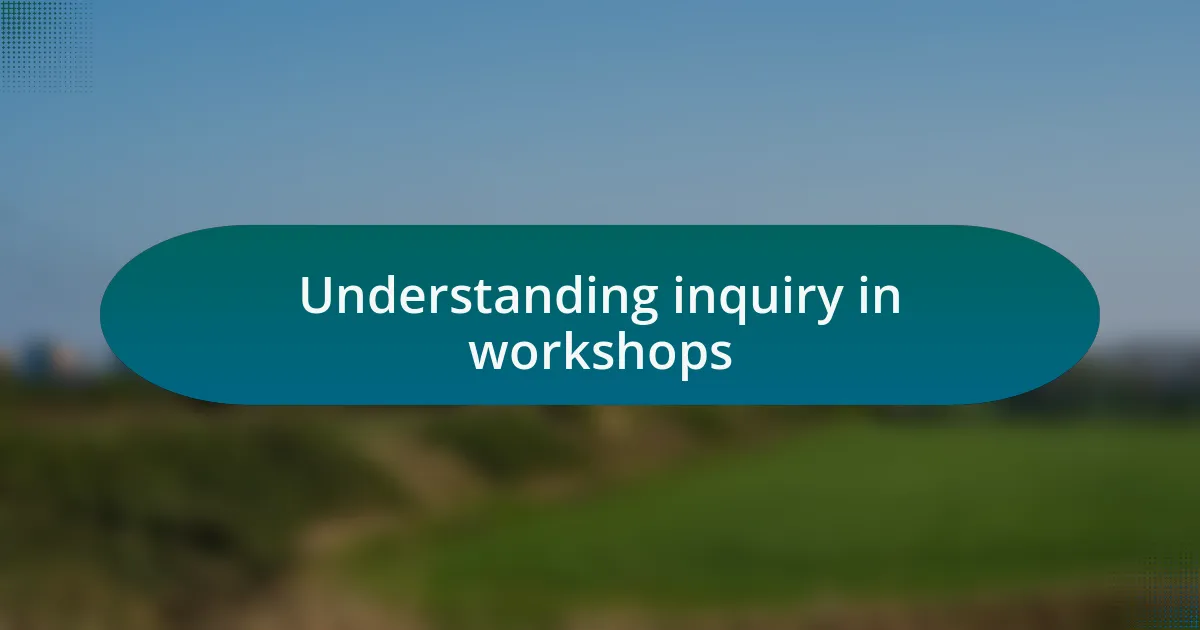
Understanding inquiry in workshops
Inquiry in workshops is like opening a door to a treasure chest of ideas. I remember a time when I facilitated a session on emerging tech trends; the moment I posed an open-ended question, the room buzzed with energy. It’s fascinating how a simple question can ignite curiosity and lead to unexpected insights.
What makes inquiry so essential in workshops is its ability to shift the focus from mere information delivery to active engagement. I often find that when participants ask questions, they not only seek clarification but also weave their experiences into the conversation. It’s a beautiful reminder that each person’s perspective adds a unique layer to the collective understanding.
Exploring this concept further, I believe it’s vital to create a safe space where participants feel comfortable to inquire. In one workshop I led, I shared a personal challenge I had faced in implementing a new technology. This vulnerability encouraged others to open up about their struggles, transforming the atmosphere from passive listening to a collaborative exchange of insights. Isn’t that what makes workshops truly memorable?
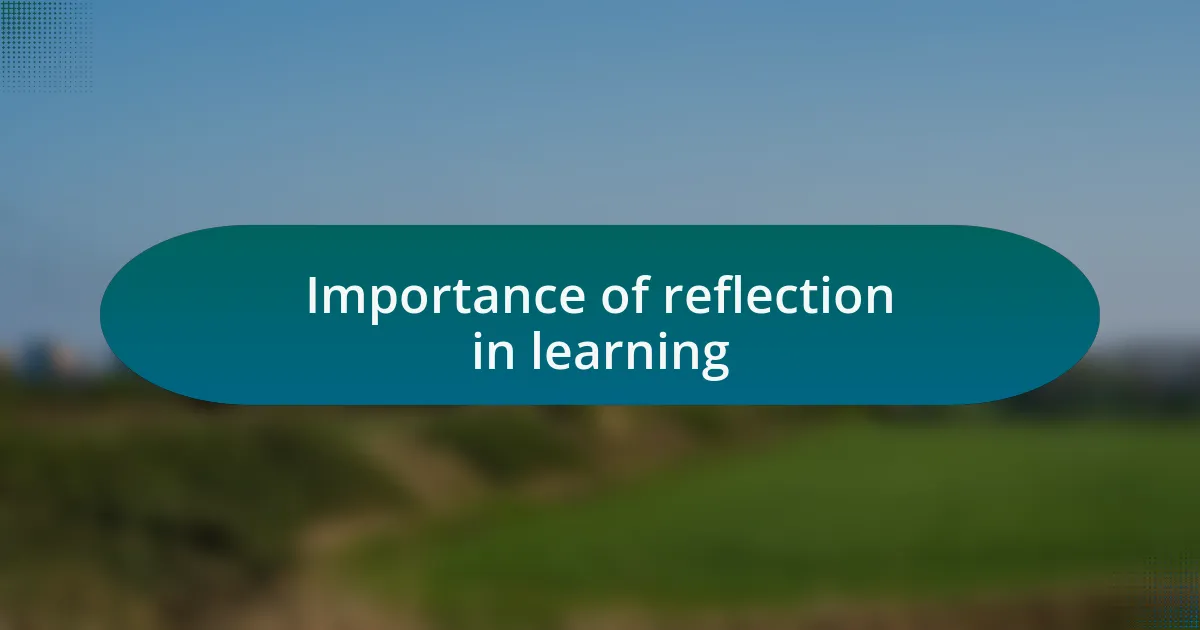
Importance of reflection in learning
Reflecting on experiences is pivotal in learning, as it turns the chaos of information into meaningful understanding. I’ve noticed that when I encourage participants to take a moment to think about what they’ve learned during a workshop, they often connect the dots in ways I couldn’t have imagined. Doesn’t it seem that sometimes, the real learning happens after we pause to absorb?
In my experience, reflection deepens the learning process, enhancing retention and application in real-world scenarios. During a recent workshop focused on AI applications, I asked attendees to jot down their takeaways and potential applications. The room fell silent, but I could see the gears turning in their minds. Those few minutes sparked conversations later on that were richer and more insightful, proving that reflection is not just a step but a necessary part of learning.
Moreover, I find that when learners engage in reflection, they often uncover personal biases or gaps in their understanding. A participant once shared how reflecting on an agile project revealed assumptions that were holding their team back. By sharing this insight, they not only transformed their own perspective but also inspired others to question the status quo. Isn’t it incredible how a deep reflection can lead to breakthrough moments for not just one individual, but for the entire group?
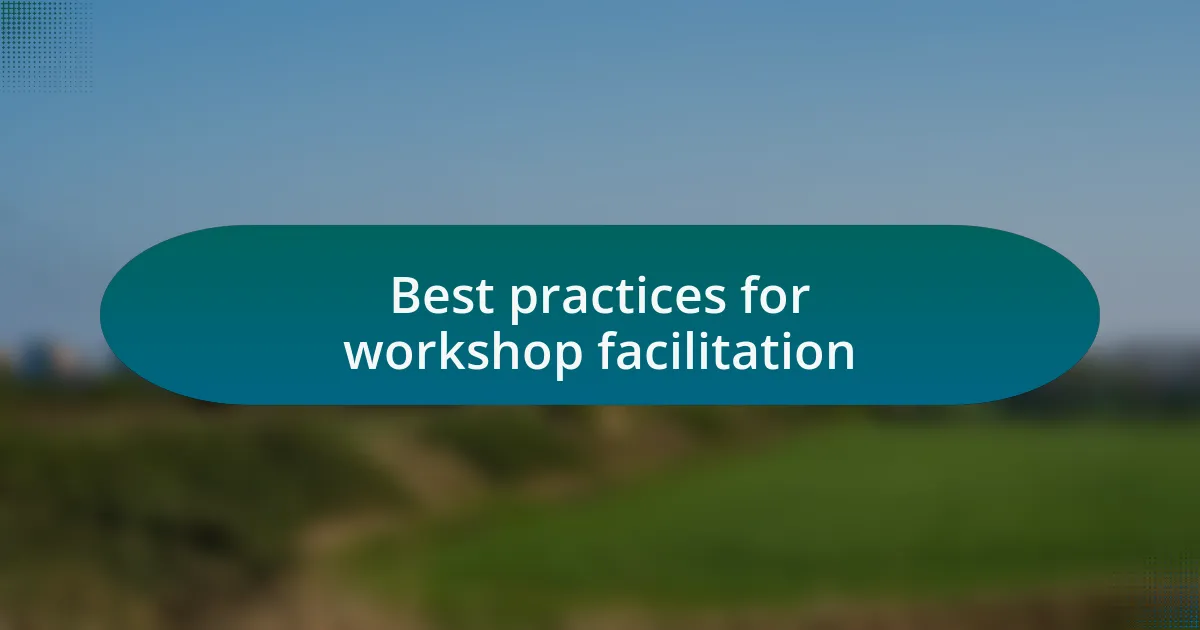
Best practices for workshop facilitation
Facilitating an effective workshop demands careful attention to the environment and dynamics at play. One technique I’ve found particularly effective is setting clear expectations at the outset. For instance, during a recent tech-focused workshop, I laid down ground rules that encouraged open dialogue and respectful disagreement. This not only created a safe space but also empowered participants to voice their thoughts freely. Have you ever noticed how a few simple guidelines can drastically shift the energy in a room?
Another best practice is to actively listen and adapt to the group’s needs throughout the workshop. In one session, I noticed that a particular topic sparked unexpected passion among attendees. Instead of sticking rigidly to the agenda, I chose to dive deeper into that discussion, allowing participants to explore their ideas authentically. It turned out to be the most engaging part of the workshop, forging connections that a strict schedule could never have achieved. Isn’t it fascinating how flexibility can unleash a group’s creativity?
Lastly, leveraging technology can significantly enhance workshop facilitation. Tools like live polls or collaborative platforms make the experience interactive and help gauge real-time feedback. During a recent webinar series, I integrated an anonymous polling feature, which encouraged participants to share their opinions without hesitation. The results sparked discussions I hadn’t anticipated, leading to richer engagement. When was the last time technology reshaped your vision in a workshop setting? It’s a game changer in connecting with participants in today’s digital age.
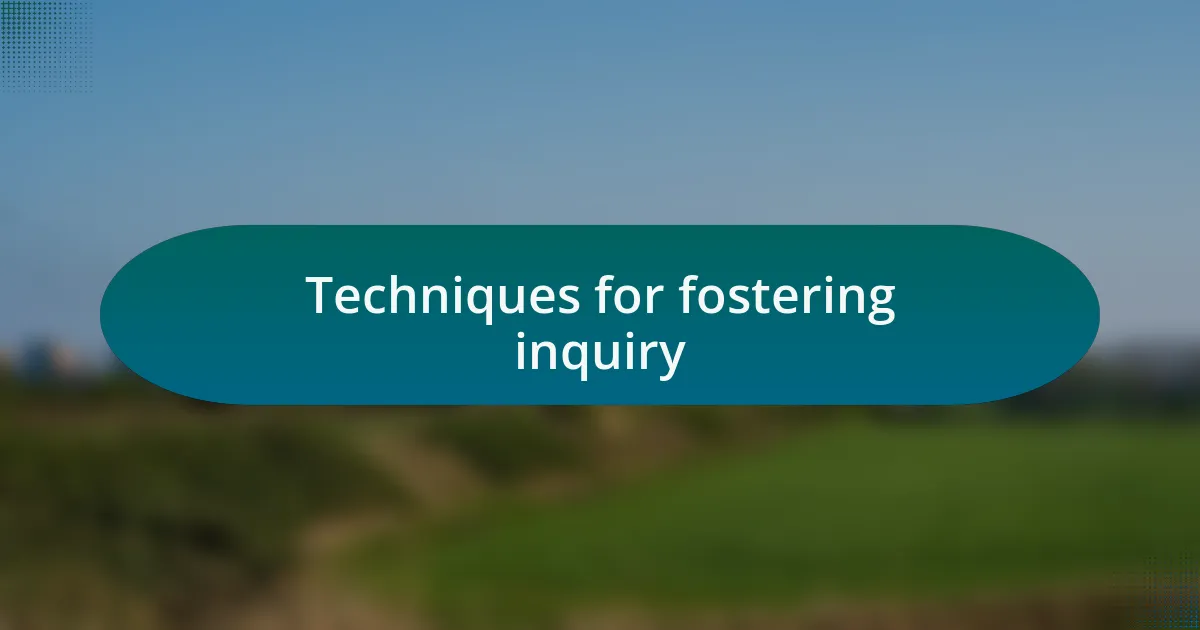
Techniques for fostering inquiry
One of the most effective techniques for fostering inquiry is the use of open-ended questions. In my experience, posing questions like “What challenges do you see in implementing this technology?” invites participants to think critically and share diverse perspectives. I recall a particularly dynamic workshop where a single question opened a floodgate of ideas, transforming the session from a one-way lecture into a vibrant discussion. Have you ever felt the energy shift in a room when everyone is encouraged to contribute? It’s truly rewarding.
Incorporating small group discussions can also enhance inquiry. When I split participants into pairs or trios, I often see them delve deeper into the subject matter than they would in a larger group. Just last month, while facilitating a session, I noticed that the quieter individuals really shone when given this more intimate setting. Their insights added layers to our topic that would have been missing otherwise. Isn’t it empowering to give everyone a chance to articulate their thoughts in a supportive environment?
Finally, utilizing reflective practice can significantly encourage inquiry. After a workshop, I often ask attendees to jot down their thoughts on what they learned and how it applies to their work. I once implemented this approach after a tech innovations workshop, and the feedback was enlightening. Participants expressed not only what they enjoyed but also areas they wanted to explore further, shaping future sessions. How often do we take a moment to reflect on our experiences? These insights can be incredibly valuable in guiding personal and group growth.
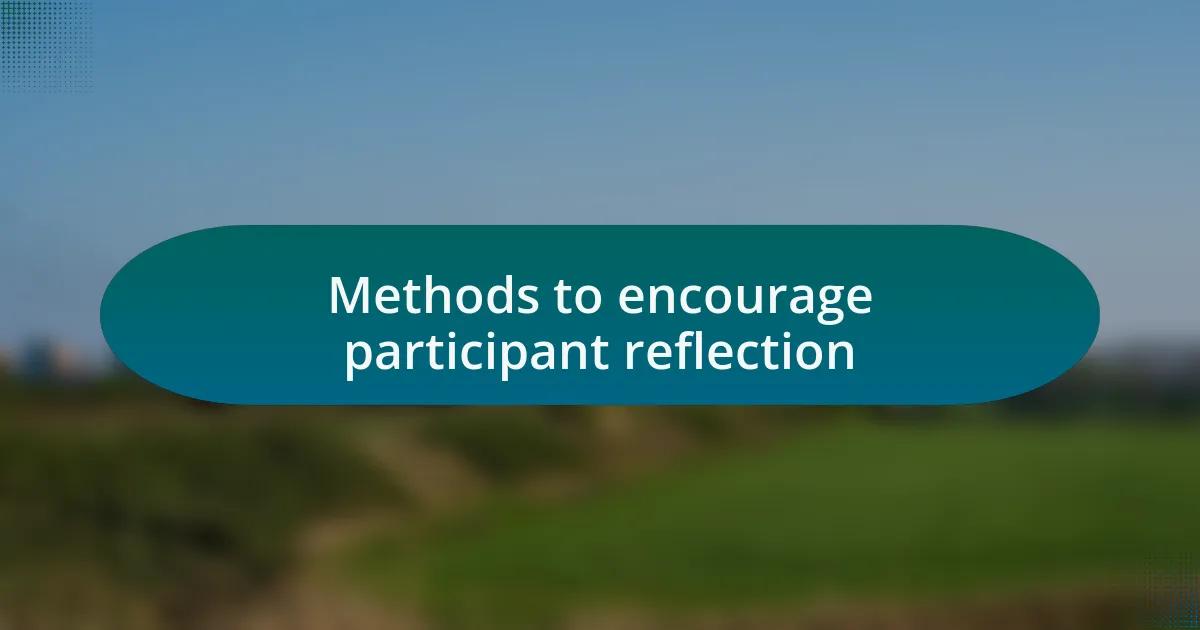
Methods to encourage participant reflection
Encouraging participant reflection can be beautifully enhanced through the use of journaling during workshops. I remember a session where I handed out notebooks at the beginning and invited everyone to jot down their thoughts throughout the day. The atmosphere shifted from passive listening to engaged contemplation, as I could see people pausing to reflect before sharing. Have you noticed how writing can unlock deeper feelings and ideas that might otherwise stay silent?
Another method I’ve found effective is the “Think-Pair-Share” technique, where participants first think about a question individually, then discuss their thoughts with a partner before sharing with the larger group. I once facilitated a tech workshop where this method allowed attendees to voice their unique perspectives, leading to insights I hadn’t anticipated. It was exhilarating to witness those “aha” moments when participants realized they shared similar challenges and solutions. Isn’t it amazing how connecting with just one other person can open the door to broader conversations?
Finally, concluding workshops with a dedicated reflection time can cement the insights gained during the session. I often set aside the last few minutes for participants to consider what resonated most with them and how they can apply these lessons moving forward. On one occasion, a participant shared that their takeaway was not just about the technology discussed, but also about the collaborative spirit they experienced. It reminded me that sometimes the greatest revelations come from unexpected places. How often do we pause to truly consider our next steps, and what a difference that can make in our journeys?
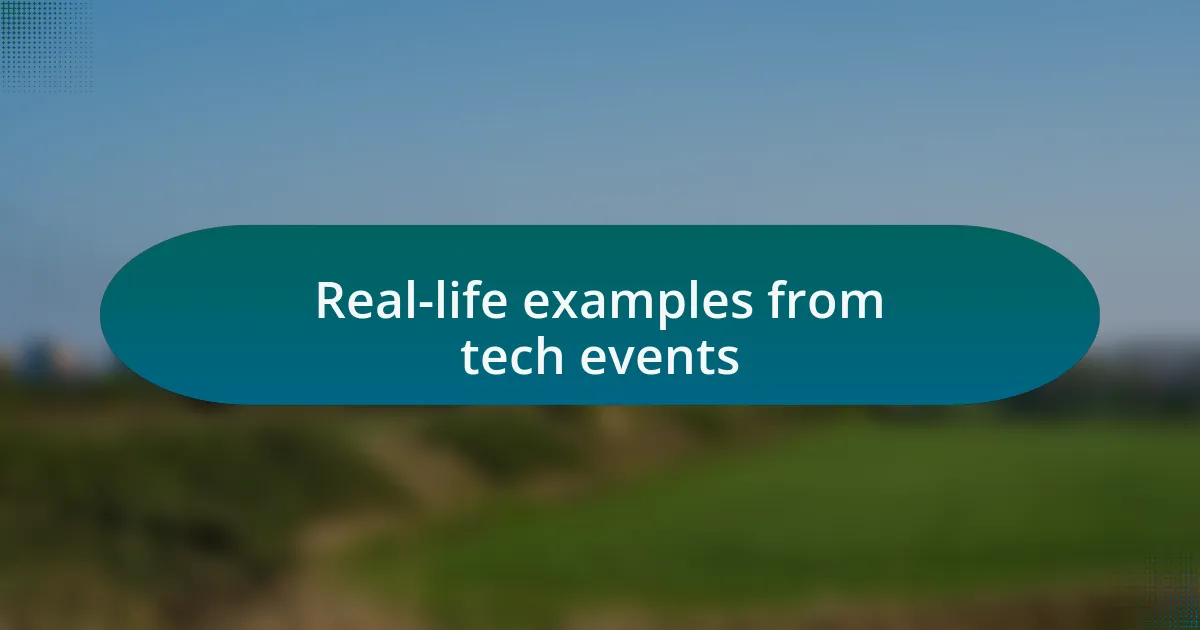
Real-life examples from tech events
During a recent tech conference, I participated in a breakout session focused on artificial intelligence. The facilitator had us break into small groups to tackle a real-world scenario: how AI could improve accessibility for individuals with disabilities. I remember the energy in the room as participants exchanged ideas. It was a perfect blend of creativity and urgency, highlighting how meaningful tech can be when we work collaboratively. How often do we miss the voices that bring richness to our understanding?
At another event, I encountered a compelling panel discussion on cybersecurity, where audience members were invited to pose questions anonymously through an app. It encouraged honesty and vulnerability, creating a space where everyone felt free to voice their concerns. I vividly recall a moment when one attendee shared their personal experience with a data breach, prompting genuine dialogue around solutions. Isn’t it fascinating how sharing personal narratives can transform abstract topics into relatable discussions?
Lastly, during a tech innovation workshop, we wrapped up with a group reflection on our favorite takeaways. I was struck by how many participants expressed gratitude for the chance to connect over shared experiences. One participant discussed how the workshop shifted their perspective on technology as a mere tool to seeing it as a catalyst for positive change. When was the last time you felt a shift in mindset that empowered you to take action?
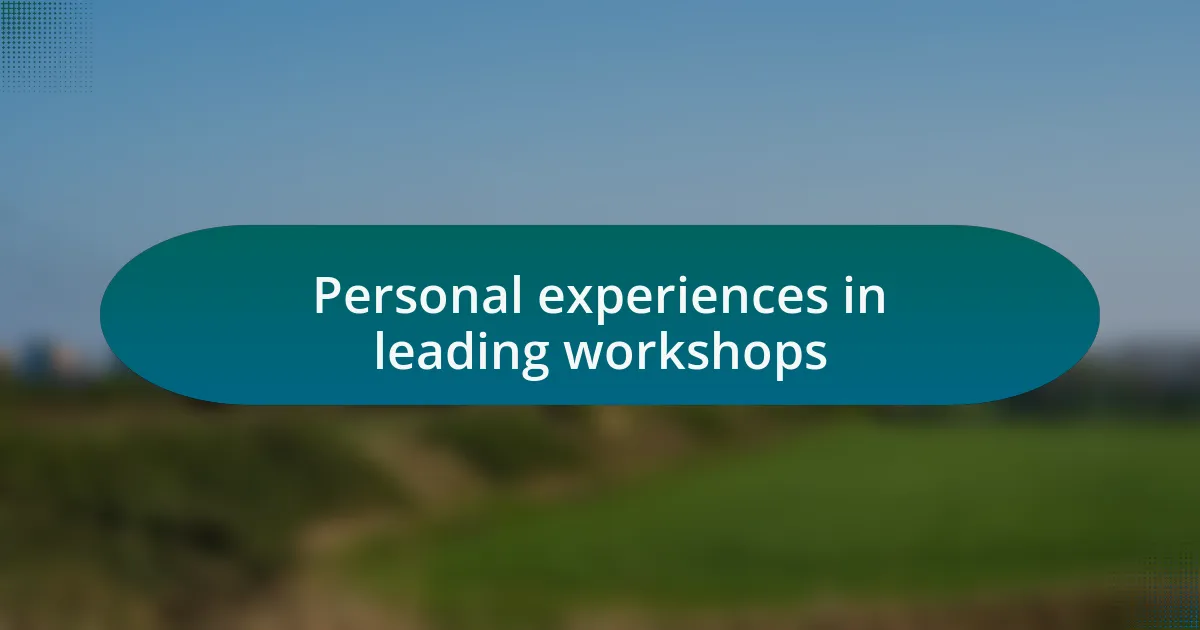
Personal experiences in leading workshops
Leading workshops has always been a profoundly transformative experience for me. I vividly recall a session on cloud computing where I employed a hands-on approach, encouraging participants to share their previous experiences with cloud services. As they did, it became apparent how a simple exchange of stories led to a deeper understanding of complex concepts. Isn’t it amazing how our individual journeys can illuminate a collective path?
In another workshop, we focused on Agile methodologies. I encouraged attendees to reflect on their past projects and identify what went wrong. One participant shared a story about a failed project due to poor communication. It prompted a lively discussion that turned into a collaborative brainstorming session. How often do we overlook the value of learning from failure? I think it’s essential to unpack those tough moments to foster growth.
I also remember a workshop where I introduced an interactive element: a role-playing exercise on tech ethics. Participants took on different personas and debated ethical dilemmas. The reactions were enlightening; many were surprised by how their perspectives shifted when embodying different roles. Isn’t it curious how stepping into someone else’s shoes can change our viewpoint? This technique not only sparked rich discussions but also drove home the importance of empathy in technology development.